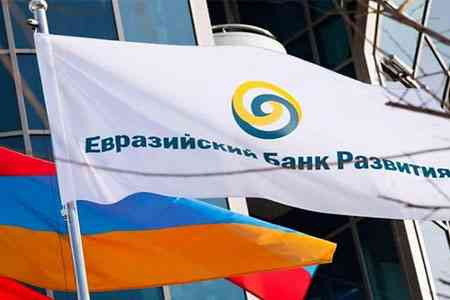


ArmInfo.During the III Eurasian Economic Forum, Sergey Ignatov, Senior Managing Director of the Eurasian Development Bank (EDB), presented the Bank's main achievements and plans regarding transport connectivity in Eurasia. This area is one of the key priorities of the EDB in accordance with the Bank's Development Strategy for 2022-2026.
Ignatov's report was presented at the discussion "Transport Connectivity of Eurasia: Image of the Future" during one of the key panel sessions of the forum, which is taking place in Yerevan and is dedicated to the 10th anniversary of the signing of the Treaty on the Eurasian Economic Union (EAEU).
The EDB Senior Managing Director noted that the Bank is actively implementing transport infrastructure development projects in partnership with governments and other multilateral development banks. Among such projects is the construction of the Big Almaty Ring Road (BAKAD), which was commissioned in June 2023. Thanks to this project, implemented with the involvement of funds from the EDB, the European Bank for Reconstruction and Development, the Asian Development Bank and the Islamic Development Bank, the transit time of the transport hub of Kazakhstan's largest city, Almaty, has been halved, and the delivery time of goods along the Europe - Western China route has been reduced by an hour.
In addition, Ignatov emphasized the importance of projects that provide additional connections and complementarity of transport corridors in Eurasia, among which the project to build a new Kazakh-Chinese border crossing and the Ayagoz-Bakhty railway line stands out. This project has the potential to expand container transportation capabilities on the China-Europe route and contributes to the realization of the high transit potential of the EAEU countries. "In 2024, the Bank published an analytical report in which it outlined the priorities for the further development of the Eurasian Transport Framework (ETF) and increasing economic and trade connectivity in the region. The ETF is capable of increasing cargo flows by 40% by attracting additional transit, creating a transport crossroads in the region and acting as a safety net for global logistics in the event of disruptions on deep-sea routes for the delivery of goods between Europe and Asia," Ignatov noted.
According to the EDB Senior Managing Director, the Bank provides technical assistance in preparing and structuring investment projects through the FCS, which provides financial support to both potential borrowers at the stage of preparing future projects and national governments or organizations whose projects are aimed at developing the institutional environment and promoting economic development and growth. The Fund's resources are formed through deductions from the Bank's net profit and funds raised from donors. In addition, the EDB has a wide range of credit and non-credit products for PPP projects, and also provides states with technical assistance in implementing PPP legislative reforms, strengthening institutional mechanisms, building up practical competencies in structuring bankable PPP projects, and much more.
The business program of the III Eurasian Economic Forum includes about 30 events. The main topics were the most pressing and popular issues of integration processes in the EAEU. The event is aimed at the participation of heads of large, medium and small businesses of the member states and third countries, heads and representatives of government bodies of the countries of the Eurasian region, as well as heads and members of governments of third countries, representatives of international, scientific and educational organizations interested in developing cooperation within the Union. The Eurasian Development Bank (EDB) is a multilateral development bank implementing investment activities in the Eurasian space. For over 18 years, the EDB has been promoting the strengthening and expansion of economic ties and the comprehensive development of its member countries. The authorized capital of the EDB is USD 7 billion. The main share of the EDB portfolio is occupied by projects with an integration effect in the areas of transport infrastructure, digital systems, green energy, agriculture, industry and mechanical engineering. In its activities, the Bank is guided by the UN Sustainable Development Goals and the ESG principles.